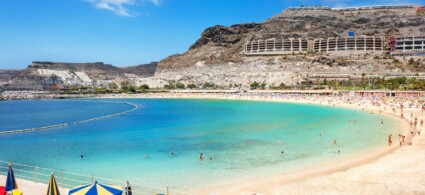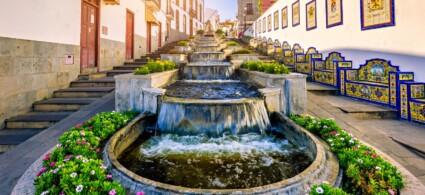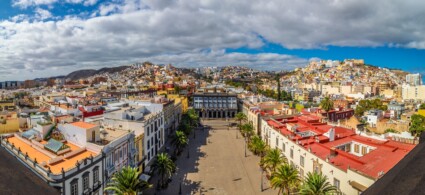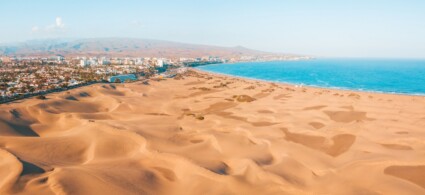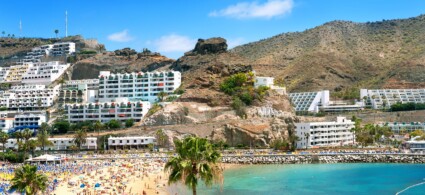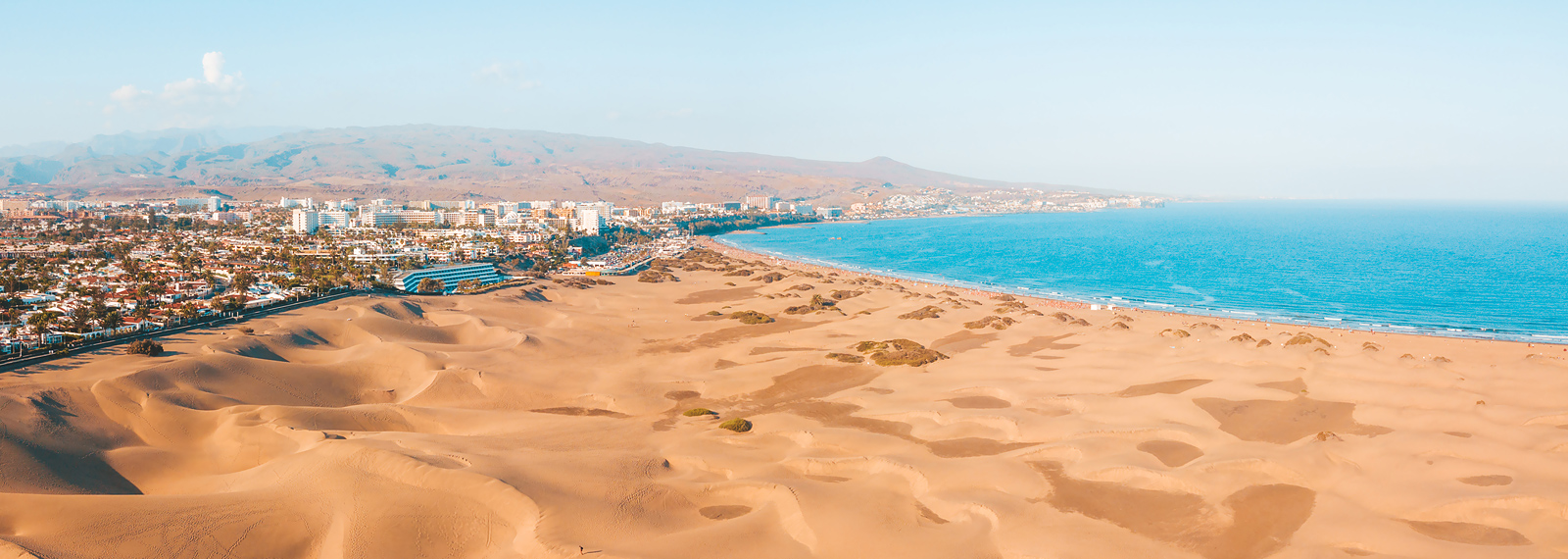

Gran Canaria is the third largest island in the Canarian archipelago, but the most populated. It is in itself a miniature continent, with a varied terrain ranging from rocky relief to expanses of green to sandy coastlines.
Gran Canaria, besides attracting millions of beach tourists, also attracts travellers in search of hiking, cycling and water sports. The historic capital Las Palmas appeals to culture lovers and is one of the largest cities in the whole of Spain. The south coast of the island is now dominated by a series of holiday resorts that are the main source of income for the economy of Gran Canaria. Maspalomas is undoubtedly the most popular and the main tourist life is developed in its surroundings.
The Canaries are often described as the islands of eternal spring, and Gran Canaria is certainly no exception. It is a year-round destination, but of course during the winter the temperatures are lower and the sea waters can be a little too cold for swimming! In this case, one can still dedicate oneself to all the other activities that the island offers.
Already from April until October there is an increase in tourists, who come here to escape the heat of continental Europe. Accommodation and flight prices are lower during the winter months and reach their highest rates in August.
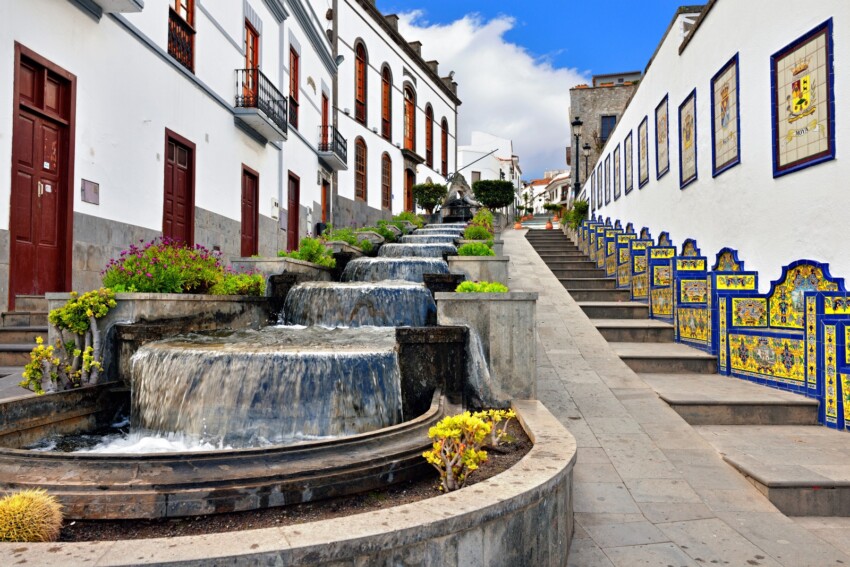
Gran Canaria is a very diverse island full of natural landscapes, which seem to vary in every corner, thanks to the microclimates brought by the winds. It is an island of beaches, but also of high mountains, as the interior hides a hidden heritage of volcanoes and ravines.
The island is the ideal place for hiking and active tourism enthusiasts, an island unlike any other, offering the possibility of savouring its extremely varied natural environment and also a splendid sea.
Due to the volcanic origin of the Canary Islands and their special climatic conditions, there is also a rich and special vegetation, which is worth getting to know in one of the many botanical gardens and orchards.
Gran Canaria offers so many things to see that you have to be able to organise your time well. From the larger towns to the typical villages, from the inland peaks to the rugged coastline, you will be amazed at every turn.
The least you can do during your stay on the island – apart from the sea, of course – is to visit Las Palmas de Gran Canaria, the capital city in the north-eastern part of the island, a town with a magnificent beach. Don’t miss the beautiful villages of Arucas, dominated by the huge church of San Juan Bautista, and Firgas, small but famous for its mineral water production.
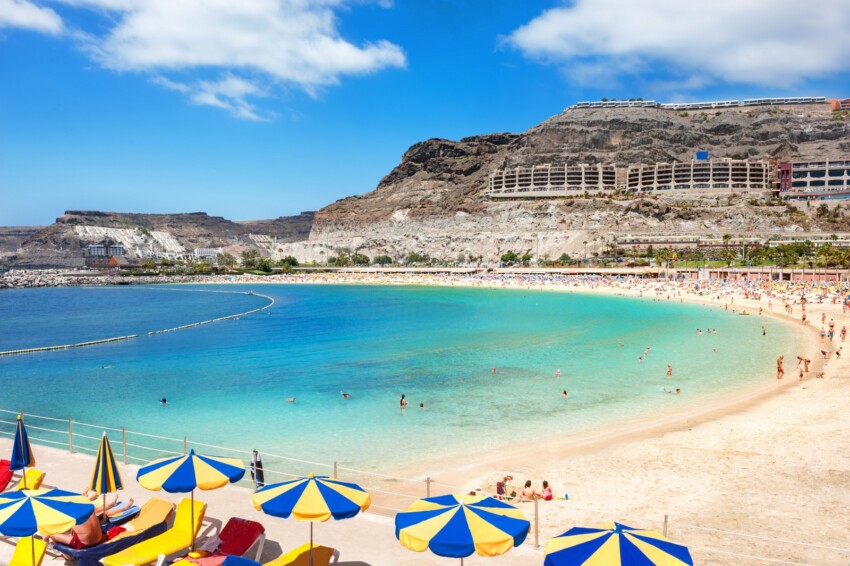
Gran Canaria has 230 kilometres of coastline and some of the most beautiful beaches in Europe. Big, small, sandy, rocky… they come in all shapes and sizes and provide the ideal setting for a fun-filled holiday in the sun. From the striking peaks of the Maspalomas dunes, via the ever-popular Playa del Inglés and the romantic Playa Amadores, to the tranquil Playa Taurito or San Agustín, there are beaches to suit everyone, even those who want to enjoy water sports, including water-skiing, windsurfing, sailing and scuba diving.
Puerto Rico is a great place to take a boat trip along the coast and Las Palmas de Gran Canaria is home to the popular Playa de las Canteras, with a fantastic stretch of golden sand and azure waters.
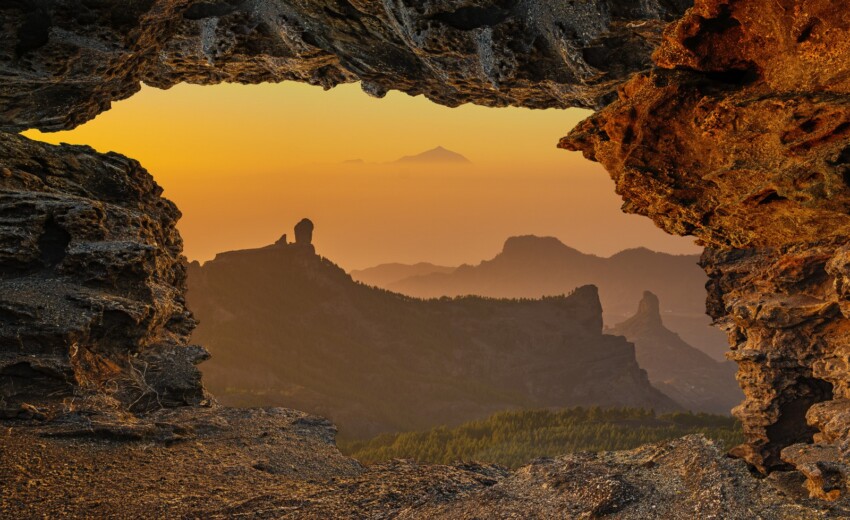
Gran Canaria’s resorts cover less than 1 per cent of the island, but about half of the visitors unfortunately don’t stray far from them. People often limit themselves to experiencing this island as a place for a simple, relaxing beach holiday, but in reality there is an entire miniature continent to explore and many ways to do so.
The advice is to venture around the island and fully enjoy its beauty. Generally speaking, Gran Canaria can be said to be a place that lends itself to active, itinerant travellers.
It is also a destination frequented by families, but because of the wonders it offers, it is perfect for the stay of tourists who are less constrained by special needs and comforts. However, if you are travelling with children, remember that the island offers many attractions, including splendid water parks, such as the Palmitos Park in Maspalomas.
An activity on Gran Canaria that has increased considerably in popularity is trekking. The regional government has invested in the recovery of the Caminos Reales (royal roads) and reopened them to the public.
These ancient routes, once the only way to reach the interior of the island, are concentrated on Cruz de Tejeda and radiate from there to cover large parts of Gran Canaria. Almost 66,000 hectares are now protected land that allows access to these old roads. The routes have different difficulties so that they can be adapted to all visitors.
Walking or hiking is a great way to explore lesser-known, unspoilt landscapes and immortalise the dazzling beauty of ancient Gran Canaria with your camera. If you love photography, you can take wonderful photos of seascapes, mountains, sandy and desert landscapes.
Gran Canaria’s fantastic climate means that various sports can be practised on the island. If you love water sports, you are in the right place: the crystal-clear waters are excellent for diving. Windsurfing, water skiing and surfing are sports practised at all levels and there are also many schools where you can take lessons from scratch.
As already mentioned, given the mountainous scenery of the hinterland, mountain sports such as hiking, mountain biking and climbing are very popular.
For deep-sea fishing enthusiasts, there are many organised excursions that depart mainly from the ports of Las Palmas, Puerto Rico and Pasito Blanco.
In all tourist areas of Gran Canaria there is the possibility of participating in tours organised by various local agencies, dedicated to the exploration of the most important points of interest. Not only on the island but it is also possible to participate in boat tours to other Canary Islands.
Many tours are also organised to visit historical villages, which offer a less touristy view of the island. However, all these destinations can be visited independently; you can hire a car or travel by bus or taxi.
The island is a privileged place for watching these magnificent cetaceans due to its waters rich in marine life and its location in the Atlantic.
Several companies offer boat tours that depart mainly from Puerto Rico, Puerto de Mogán and Las Palmas. These excursions are designed to offer visitors the opportunity to see several species of dolphins, such as the bottlenose and common dolphin, as well as several species of whales, including the pilot whale and sperm whale.
Excursions are available all year round, thanks to the mild climate of the Canaries. However, the spring and summer months tend to be the most favourable for regular sightings. Taking part in one of these excursions is a great way to get close to nature and experience an unforgettable adventure in the waters of Gran Canaria.
Is Gran Canaria for you a romantic getaway to an endless beach, a family holiday by the sea, an idyllic weekend in an exceptional natural environment, or just a few days to get away from it all, do some sport or sunbathe?
Whatever the answer, Gran Canaria is the perfect destination. You will find hotels and flats to suit all tastes, from beautiful modern hotels located on semi-private beaches to luxury complexes for the more affluent pocket, spread throughout the busy and lively resorts offering endless amenities and services for the whole family.
For those seeking privacy, a very original idea is to sleep in exclusive villas of the highest standards or even in small charming hotels with just a few rooms in the mountains. Whichever type of accommodation you choose, you will find top-quality services and the surroundings will impress.
With one of the best beaches in Gran Canaria, a cobbled old town, classy shops and dozens of quality restaurants, Las Palmas is the perfect place for a warm city break.
In the evenings, you can choose from local fish restaurants, excellent steak from South America and many national cuisine restaurants. Choose Las Palmas if you are looking for the spirit of a Spanish city, with the beach right on your doorstep.
Maspalomas is basically a mixture of bungalows, hotels and palm trees on a plain just behind its famous dunes. It is a quiet place to stay and is also ideal for golf lovers, as there is a golf course in the area. There is also a huge public park. Maspalomas is basically suitable for those who want a quiet holiday in the sun.
Much quieter than neighbouring Playa del Ingles, Maspalomas does not have much nightlife. Most of the best bars and restaurants can be found on the Meloneras promenade.
Puerto Rico is one of the places that foreigners often choose when moving to Gran Canaria. There are excellent places to eat, quality bars and nightclubs, but it is also a great place for those looking for a quiet holiday, as accommodation is located in quiet, residential areas.
Most of the evening attractions are concentrated in the giant Puerto Rico shopping centre. The resort is usually frequented by British and Scandinavian tourists, who love the beautiful Playa Amadores, always warmed by the sun.
Gran Canaria enjoys direct flights with Europe as well as daily connections with all the other islands of the archipelago and mainland Spain.
The direct flights to Las Palmas de Gran Canaria are carried out by the airlines Aer Lingus, Air Europa, Austrian Airlines, Brussels Airlines, Condor, Corendon Airlines Europe, Discover Airlines, Eurowings, Finnair, Iberia, Iberia Express, Jet2, Lufthansa, Norwegian, Norwegian Air Sweden AOC, Ryanair, SWISS, Scandinavian Airlines, TUI, TUI fly Belgium, Transavia France, Volotea, Vueling Airlines, AirBaltic, EasyJet and Transavia from the airports of Amsterdam, Barcelona, Belfast, Berlin, Birmingham, Bristol, Brussels, Cardiff, Copenhagen, Dublin, Duesseldorf, Edinburgh, Frankfurt, Glasgow, Hamburg, Helsinki, Leeds, Liverpool, London, Madrid, Manchester, Marsiglia, Munich, Newcastle, Nottingham, Oslo, Paris, Stockholm, Vienna and Zurich.
The alternative is to take a flight with a stopover in Madrid or Barcelona. Vueling and Ryanair offer attractive fares for connections to mainland Spain. It is also possible to fly directly to and from Funchal, the capital of Madeira (Portugal).
There are also regular ferry and hydrofoil services to and from Tenerife, Lanzarote and Fuerteventura. Passengers arriving from these destinations and also from mainland Spain (from Cadiz) arrive at Puerto de la Luz in Las Palmas in the north of the island. Gran Canaria is also often included in many cruises that stop over in the Canary Islands archipelago.
What's the weather at Gran Canaria? Below are the temperatures and the weather forecast at Gran Canaria for the next few days.
Gran Canaria is the most central island of the archipelago, more or less equidistant from Tenerife and Fuerteventura. It is about a four-hour flight from the European coast.
